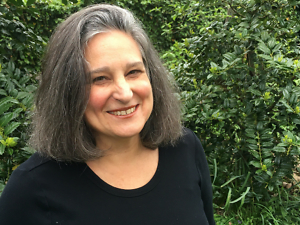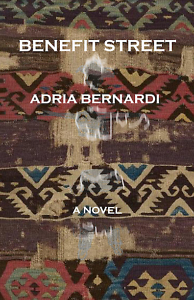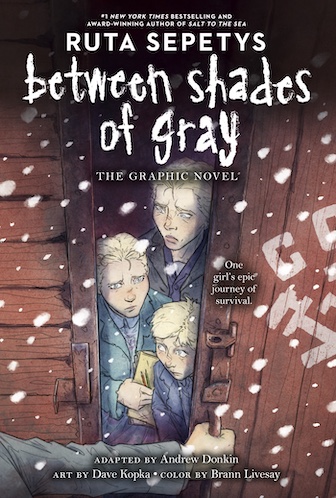The Displaced
Adria Bernardi’s Benefit Street is a lyrical tale of exile
Nashville-based author and translator Adria Bernardi is nothing if not prolific. Her prior publications include an oral history, a book of literary essays, a short story collection, and two novels, as well as eight translations from Italian into English. Her just-released third novel, Benefit Street, is a lyrical tale of exile.

Narrated by a woman named Şiva, Benefit Street portrays a vast number of characters driven out of an unnamed capital of an unnamed country. These are wives and husbands, mothers and fathers, children, grandmothers, neighbors and coworkers, and many others. At the story’s heart are five female friends, all of whom work as teachers.
For many years, these five women have met for tea and sweets every Tuesday after work and before dinner. At the teahouse, they catch up, laugh, share stories and details of their lives and days. Devoid of quotation marks, the book bears an unusual rhythm and a tone simultaneously intimate and alien. Şiva describes the women’s weekly date:
Little bells, little cups. Coffee pots. A toy iron. The cushions were woven wool and worn at the edges. We’d been coming here for years. We’d all become schoolteachers together. Aminah was late. Aminah was always late.
Am I ready to see you, my friends, Miri said. It’s been a day.
Mine started with water leaking through the ceiling, said Ana.
They fired another teacher, Sidra said. I’ve got nine more students.
Nine?
Nine.
How many did you have before? Ana asked.
Thirty-nine.
 The five refugees have landed here after displacement upended their lives and forced them, in this new place, to carry on. But their new place in not a sanctuary. War in the East poses a growing threat to the collective constitutional rights of people in this country. As their liberties are tattered by an increasingly dictatorial government, this group of women (as well as their husbands and families) are forced to reckon with lifelong ideals concerning freedom, equality, and justice.
The five refugees have landed here after displacement upended their lives and forced them, in this new place, to carry on. But their new place in not a sanctuary. War in the East poses a growing threat to the collective constitutional rights of people in this country. As their liberties are tattered by an increasingly dictatorial government, this group of women (as well as their husbands and families) are forced to reckon with lifelong ideals concerning freedom, equality, and justice.
With their idealism already tested, the women are brought to a breaking point by the revelation that a longtime member of their social circle, a man who ostensibly works as a healer, has sexually abused a woman in his care.
As readers, we’re inside Şiva’s head, seeing what she sees, but her perceptions and thoughts only come to us in slivers or obliquely. Unremitting access to the internal lives of literary characters is now so common in contemporary American fiction that Bernardi’s sparing and poetic technique wields a particular force. Very rarely, the perspective flips out and Şiva’s address is disarmingly direct, spoken the way a familiar stranger might. Şiva breaks up a description of the predatory healer with memories of good times, as well as this pronouncement:
You yourself have been lost, you know what it’s like, traveling in a big city lit up at night, having arrived late, later than planned, tired. … It is getting late, but still you do not ask for help, because to ask for help is to reveal yourself as lost, and to reveal yourself as lost is to reveal yourself as ignorant and vulnerable. … You cannot turn back.
After admitting to a stranger that “you” are lost, the woman advises, “Simple. Keep following this road towards where you can’t see it. It will curve around to the left, and then you’ll be back again on the road going north.”
Much of Benefit Street centers on geography, specifically crooked streets. This focus feels synonymous with the characters’ path toward justice. The novel opens with this line: “There was not a straight street in my city.” Much later in the book, which has no chapters, Şiva reiterates the same sentiment, then qualifies it:
There are plenty of straight streets, you can find them. But mostly the straight streets are short and do not go from here to a very far there. The boulevards are not straight either; even the ones that turn into highways that lead to other cities. There was another saying in my city: It’s like trying to make a curved road straight.
Estranged from her mother, Şiva embarks on a dangerous and lengthy trek into the mountains to reconcile with her. Their division further exemplifies the trauma emigrants experience when they are uprooted and forced from their homeland due to regimes attempting to displace (or even erase) specific groups of people.
Şiva’s mother, in the mountains, weaves elaborate rugs. She does this, primarily, by creating knots:
One kind of knot is wrapped around two warps; another kind is wrapped around one. … When a row of knots is complete, two warps are passed through the weft and are squeezed by means of a heavy comb. This is how knots are fixed firmly in place.
This yoking together serves as a symbol of both reconciliation and unbreakable ties, the heart of hope for the refugee.

Sarah Norris has written about books and culture for The New Yorker, San Francisco Chronicle, The Village Voice, and others. After many years away, she’s back in her hometown of Nashville.


